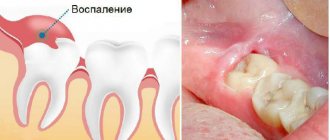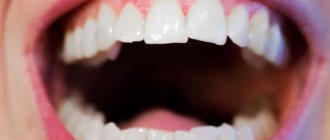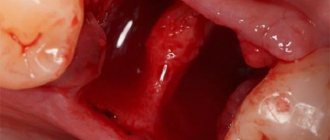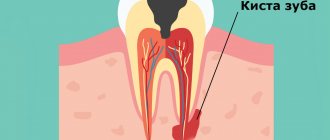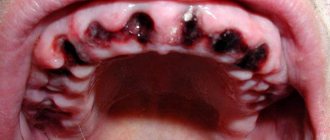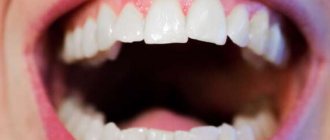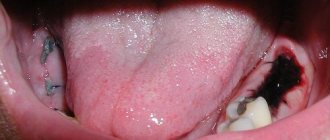Tooth extraction is not a pleasant process. Painful sensations and swelling of the gums after extraction of a tooth are an adequate response of the body to the operation. Usually, unpleasant symptoms increase 3-4 hours after the effect of the anesthetic drug wears off. Normally, pain, swelling, redness of the mucous membrane after a conventional extraction are observed for another 2-3 days; after a complex extraction, symptoms persist for 3-5 days. If your gums hurt after tooth extraction after 7 days or longer, you need a medical examination.
Why does my gum hurt?
Unexpressed aching pain and slight swelling of the gums appear due to injuries to soft tissues, nerves, and jaw bone when removing a tooth from its bed. The gum tissue swells, the nerve endings are compressed, hence the pain. How much your gums hurt after tooth extraction depends on:
- Patient's pain sensitivity;
- degree of complexity of the intervention;
- features of the clinical case;
- location of the dental unit (after extraction of molars, the injury is greater, the pain lasts longer);
- state of immunity.
The body’s normal response from the development of complications is distinguished by the following properties: the pain does not intensify, pathological symptoms are present for no more than 7 days, and no other signs of deterioration in well-being are observed.
Complications after gum incision
Tumor (edema)
As a rule, swelling occurs after the removal of a wisdom tooth with an incision in the gum. This is a typical reaction of the body to surgery. However, in some cases, the tumor reaches gigantic proportions, and the cheek or lip swells greatly. This is a clear sign of alveolitis (inflammation of the socket); in this case, it is necessary to urgently visit your doctor!
Heat
An increase in temperature to 37–37.5 degrees is also considered normal. However, if the thermometer shows more than 38 degrees, then most likely an inflammatory process has begun. You need to contact the doctor who performed the operation. You may be prescribed a course of antibiotics.
Pain
Pain occurs immediately after the anesthetic wears off (after an hour and a half). Soreness is a reaction to damage to nerve endings with a surgical scalpel. To temporarily alleviate the condition, it is recommended to take a tablet of Ketanov, Pentalgin or Analgin. The pain will gradually subside after 3-4 days.
Bleeding
Excessive bleeding may occur due to damage to the vessel during the injection of the anesthetic, increased capillary fragility, or high blood pressure in the patient.
What stops bleeding? Immediately after the gum incision, the doctor applies a hemostatic sponge and, when the bleeding stops completely, sutures the wound.
If heavy bleeding starts at home, you need to make a thick tampon from a sterile bandage and apply it to the wound. You can also apply a piece of ice to your cheek for 3-5 minutes.
But if this doesn't help, call an ambulance.
Flux
Flux is an inflammation of the periosteum (dense tissue covering the jaw bone). This complication is a consequence of infection of the gums, after which the infection penetrates deeper and deeper, affecting the periosteum. In the area of inflammation, pus accumulates and a painful lump forms. With flux, a loosening incision is made in the gum (opening the abscess) and drainage is installed to drain the purulent exudate.
Complication after gum incision - gumboil (periostitis)
How long does your gum hurt after tooth extraction?
Normally, after 1-3 days, tissue swelling gradually decreases, pain goes away, and health improves. Already on the 3-4th day, the blood clot is gradually replaced by granulate, and after a week it fills the entire hole. After tooth extraction in the upper jaw, the recovery time is identical to the lower jaw, but bone regeneration in the upper dentition occurs more slowly.
In some clinical cases, the surgeon may cut the gum and drill out the jaw bone. Typically, such manipulations accompany the extraction of the outer eighth molars (wisdom teeth). Then healing takes longer than after a simple operation.
If 5-7 days after the intervention the pain does not decrease, but rather becomes more intense, you should consult a doctor. Acute, nagging, constant pain after tooth extraction can be a symptom of complications.
The tooth socket heals in approximately 2-4 weeks. Recovery time depends on the parameters of the wound and the body’s reaction to the removal procedure. Bone volume is restored approximately 6 months after the intervention.
Basic recommendations after gum incision
Implantation, tooth extraction, or opening of purulent foci is not possible without an incision in the gums. This stressful situation for the oral cavity causes considerable discomfort for a person.
Recommendations after gum incision:
- On the first day, you need maximum peace and rest;
- For 3 hours, all drinks and food should be excluded;
- In the first 3 days, hard and hot foods should be excluded, as well as excessive facial expressions;
- Any physical activity, especially those leading to blood flow to the head, should be avoided;
- Also, exclude hot relaxing baths, saunas and steam baths;
- For 7 days you need to strictly limit your intake of tobacco and alcoholic beverages;
- It is strictly forbidden to apply hot compresses to the wound or cauterize it with alcohol-containing solutions.
What to do if complications arise after gum surgery:
- Edema. Always occurs during implantation or after removal of a wisdom tooth. Small to medium edema is a normal reaction of the body. If the swelling is severe, then you need to consult your doctor to rule out the onset of alveolitis.
- Temperature. The temperature that rises a few hours after the gum incision can reach 37.5 °C, which is considered normal. However, if it goes beyond 38 °C, it may indicate the onset of the inflammatory process. In this case, you should consult a doctor to prescribe a course of antibiotics.
- Bleeding. After surgery, a blood clot usually forms to prevent bacteria from entering the socket. Bleeding occurs as a result of vascular damage or capillary fragility. To stop the bleeding, apply a thick sterile bandage to the problem area. If the bleeding does not stop, you should call a doctor.
- Pain. Natural response to surgery. The pain can be moderate or very severe. In any case, to reduce it you need to take a painkiller pill.
Dental clinic Stomatolog 11 in Moscow offers a wide range of services in orthodontics, therapeutic dentistry, and implantation. It is also popular to make an appointment with a pediatrician and for teeth whitening.
Treatment using innovative dental devices and careful attitude towards each client allows us to minimize the risks of any complications after dental interventions. You can see the work performed by a team of true professionals in the photos posted on our website and in social groups.
Choose high-quality and safe dental services in our clinic. Ensure your dental health.
Free consultation
What happens if you ignore pathological pain
The appearance of pain always signals a problem in the body. If the tooth was removed long ago, and the pain persists or increases, this is evidence of a complication. Pain may be associated with:
- Increased body temperature;
- severe swelling, redness of the mucous membrane;
- halitosis;
- purulent discharge from the socket;
- white or gray coating on the mucous membrane;
- enlargement of the submandibular lymph nodes;
- pain while swallowing;
- restriction when opening the mouth.
In this situation, you should see a doctor immediately.
Ignoring alarming symptoms is fraught with serious problems, such as abscess and osteomyelitis. These are serious pathologies that require timely, qualified treatment.
Duration of pain after tooth extraction
Every patient is concerned about the question: how many days does the gum hurt after tooth extraction? A period of 2 to 4 days is considered normal. Provided that the pain is not acute, but moderate. After the removal of a molar, the gums hurt for several days longer.
Attention! Your gums cannot hurt for more than one week, much less for a whole month. During this time, the hole should heal completely. If a person is constantly accompanied by this symptom, he urgently needs to consult a doctor. It is important to relieve inflammation in the initial stages; in advanced cases, treatment will be longer and more complex.
How to get rid of pain at home
To eliminate postoperative pain, the dentist will prescribe analgesics and cold compresses on the side of the intervention. Additionally, you can use traditional methods - mouth baths made from tinctures or herbal decoctions. Baths with an antiseptic drug are also allowed (the solution must be held in the mouth for a while and spat out). What is strictly forbidden:
- warm the operated area;
- rinse your mouth intensively (you can wash out the blood clot);
- chew on the injured side;
- “check” the hole using your tongue, fingers, and apply medicine to it.
The risk of complications depends on the complexity of the operation to remove a dental unit. Simple extraction is carried out if the tooth does not have strong, intertwined roots, it is intact, and there are no associated problems (cysts, pulpitis, periodontitis, etc.).
Extraction of dystopic teeth, which are very crooked, have intertwined, crooked roots, with a destroyed coronal part, and with an inflammatory process, is considered difficult. In such cases, a more extensive operation may be necessary with a preliminary incision in the gum, sawing the tooth into elements, extracting fragments through a hole in the jaw bone, and applying sutures. Molars are usually difficult to remove. If your gums hurt for several days after the removal of a molar, but the painful symptoms are smoothed out, then the wound is healing normally.
The main causes of pain in the gums
As soon as the anesthesia wears off, the patient begins to feel pain. Gum pain after tooth extraction for 10 days is normal. It is during this period that the wound heals completely.
Pathological pain longer than this period indicates the presence of a progressive infection. There are many reasons for inflammation. However, they all have a common beginning - removal of a formed blood clot. Food enters a fresh, unhealed wound, thereby accelerating the formation of harmful bacteria.
The main causes of cheek pain can be:
- Inflammation of the trigeminal nerve. Unfortunately, the patient may also experience hearing loss. Such a complication cannot be allowed to occur; it is worth seeking professional help.
- The remainder of the tooth in the wound will certainly provoke the accumulation of pus. This often happens when working with “complex” teeth that have crooked roots.
- The clot can be easily washed out of the dry socket. In such cases, bacteria easily penetrate the open wound, causing inflammation.
- Patients suffering from diabetes are susceptible to the formation of hematomas in soft tissues. Over time, the accumulated blood suppurates.
- The pathological process can be triggered by a cyst, which usually grows on the root of the tooth, and may remain even after surgery.
- Alveolitis is inflammation of the gums. This problem occurs when an infection gets into an open wound.
- After tooth extraction, patients often experience bleeding. This is considered the norm. However, prolonged bleeding is a reason to consult a dentist.
- Osteomyelitis is considered to be one of the most dangerous complications. The fact is that destruction occurs not only of the soft gum tissue, but also of the jaw bone. Weak immunity or neglected dental problems are the main causes of osteomyelitis. The worst thing is that the complication can infect the brain.
How to speed up gum healing after tooth extraction
The simplest and most effective technique that a dental surgeon can use to ensure fast and effective regeneration is suturing the socket. It is important to ensure that the edges of the mucous membranes are located as close to each other as possible. This will reduce the risk of secondary infection and create suitable conditions for trouble-free regeneration.
It is also very important that the patient strictly followed all medical prescriptions. The pharmacy offers a wide range of healing and anti-inflammatory ointments, gels, creams and solutions used in dentistry. But you don’t need to buy the first product that comes your way—the drug must be prescribed by a doctor.
It is very important not to touch the healing hole with your tongue or foreign objects. It is forbidden to touch the blood clot covering the wound. If you move it from its place, severe inflammation may occur. Then it will most likely not be possible to do without antibiotics.
Content:
- Why does a wound take a long time to heal after tooth extraction?
- How gums heal normally
- Gum healing time
- How to speed up gum healing after tooth extraction
- What complications can tooth extraction cause?
Healing after tooth extraction can proceed quickly or take a long time. The second option is extremely undesirable and dangerous to the patient’s health. Therefore, it is important for the patient to know how long the regeneration process takes, what symptoms indicate a secondary infection, and how recovery can be accelerated.
How gums heal normally
Very often, patients ask the doctor how long it takes for the gums to heal after tooth extraction. They want to know how quickly they can return to their normal lifestyle. The rehabilitation process is quite long. It proceeds through several successive stages:
- Stop bleeding. Takes up to three hours. As soon as the blood stops flowing, a scarlet clot forms. It prevents bacteria, viruses and microbes from penetrating deep tissues.
- The appearance of a white connective film. This is epithelial tissue. It can be seen four days after removal.
- The clot acquires a white color. Occurs approximately one week after surgery.
- Replacement of a blood clot with full-fledged epithelial tissue. It is fixed approximately 20-24 days after tooth extraction. This indicates that regeneration was successful.
As a rule, less than a month after tooth extraction, the patient is completely healthy, feels well and does not experience any discomfort while eating. If the number of roots pulled out was small, then regeneration can be completed in two to three weeks.
First aid if your cheek hurts after tooth extraction
Each of us has encountered a situation where, after tooth extraction, the gums and cheek hurt. Constant pain interferes with normal activities and prevents you from concentrating on work. You need to be as careful as possible to get rid of pain at home. If you carry out the procedure inaccurately, you can wash out the formed clot and provoke infection into the open wound.
The onset of the inflammatory process is indicated by:
- pulsation in the wound;
- swelling;
- sensation of pain in other parts of the face;
- the appearance of pus;
- weakness.
Why does a wound take a long time to heal after tooth extraction?
Ripping out a destroyed unit is a very traumatic process. This operation is comparable to any other surgical procedure. The tissue surrounding the removed roots is severely damaged. The integrity of the periodontal and periodontal zones is compromised.
Microtears of ligaments and destruction of individual nerve bundles are observed. The injured area swells, turns blue, swells, and becomes painful to the touch. It is clear that in such a situation regeneration cannot be lightning fast. It should be understood that how long it takes for gums to recover depends on many factors:
- person's age;
- an illness that necessitated dental surgery;
- characteristics of the patient's health status;
- the presence of concomitant pathologies of a systemic nature in the patient;
- the complexity of the surgical procedures being performed;
- experience of a dental surgeon;
- the need for sutures;
- the number of roots in the tooth being pulled out;
- features of the location of the unit in the dentition.
